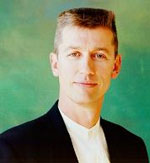Google NYC First Look: Top Google engineer talks to NYC software industry


I suggested it is surprising an engineer is the public face of the new NYC Googleplex, rather than a sales exec. Warren smiled and shared anecdotes illustrating how the Google culture pays scant attention to “marketing.”
Warren’s brief formal talk on Google’s engineering philosophy and his lengthy open Q & A from the audience underscored that Google is engineering-driven, even while it seeks to dominate the world’s advertising.Warren is not only a Googler, he is a New Yorker.
Before joining Google about two years ago, Warren co-founded and headed up the technical side of Juice Software, a NYC enterprise software startup. Prior to Juice, Warren spent 3 years as Chief Architect of Hyperion Solutions, two years in IBM's Software Solutions Division, and ten years in T.J. Watson Research. His early research spanned materials and device physics, circuit design, and computational physics and modeling. Since shifting to software and computer science 15 years ago, Warren has focused on graphics and visualization, component-based architectures and systems design, and most recently consumer-facing applications within Google such as Google's Blog Search.
Warren majored in Physics and Math at Georgia Tech and received his Ph.D. in Solid State Physics from MIT (1985).
A 2002 atnewyork.com profile of Warren’s Juice Software is insightful:
It's a brand-new enterprise software platform that bridges the gap between the desktop and the network. In essence, Juice allows users to take live data from a number of sources such as Bloomberg, Bridge and Telerate, and pipe it into customized spreadsheets such as Microsoft Excel. With the help of Juice's "application extenders" that run inside the spreadsheet, the data gets crunched and calculated in any which way templates are formatted.
Hence the term "Juiced" documents, and the genesis for the company's name. Its founders include Charles H. Ferguson, Ph.D, the creator of Web authoring tool FrontPage (now owned by Microsoft Corp); Allan Warren, Ph.D, who was the chief architect at Hyperion Solutions; and Kim Malone, formerly with CapitalThinking and telephony company deltathree.
It deploys Extensible Mark Up Language (XML) and is positioned to work with Microsoft's .NET Web services platform, which allows applications to communicate different data types regardless of operating system, device or programming language.
The main components of the Juice platform include the Java-based Server, which sits behind the client's firewall with a persistent connection and runs on all the major enterprise platforms; a client that runs on the user's desktop along with the application; data adaptors that connect a number of databases with the juice server and developer kits that help users tweak their data adaptors in their own applications.
While with Juice Software, Warren was a NYSIA member. Under his leadership, Google has recently signed-on as a Platinum sponsor of NYSIA.
Warren’s message to the NYC software industry? Google is a unique and innovative engineering driven company. After the Mountainview Googleplex, NYC is Google’s largest engineering site in the world.
When Google started its NYC operations in 2000, New York was principally a sales arm. By 2004, it housed 50 engineers in its midtown office, when Warren joined Google. Today, he co-leads more than 300 engineers at Google’s new 300,000 square foot Silicon Alley facility.
Why NYC? According to Warren, Google finds value in “putting engineers where users are.” Warren is also attracted to the critical mass of engineering talent in NYC, although the Boston tech hub offers one-of-a-kind engineering expertise.
Google NYC is not a specialized engineering operation, its 300 engineers work in teams of three on the full gamut of Google products and services. Currently, Google NYC engineers are working on about 100 different projects.
Google local search (now coupled with Maps) came out of NYC operations, Warren said, as well as blog search, mobile and Froogle services (not a success story). Spreadsheets as well, a Warren expertise.
Warren described how the Google remote engineering sites distributed development model functions. Each team of three engineers has a tech lead, but proceeds in an “informal” and “amorphous” way in a cross-site development framework. For example, GMail development may primarily be done in Mountainview, but a NYC-based team can work on a component of the product. Google’s processes are inspired by object oriented software design principles.
Of Google’s 8000 employees worldwide, approximately half are engineers. Warren stressed that Google pro-actively seeks to keep an engineering-centric culture and does all in its power to avoid undue influences from the likes of biz dev, VC and marketing folks.
Google prides itself on a flat organizational structure, to the extreme. Warren said that in an ideal world, “zero” processes and management would be the preference. While the Google culture “manages” as little as humanly possible, Warren acknowledged that as it continues to scale such a stance is challenged. Among the difficulties of a flat, distributed organization is a lack of “visibility.” Warren said there may not be one person at Google with 100% visibility across Google.
While Warren acknowledged possible down sides of the Google organizational machine, he clearly believes in the power Google derives from its uniqueness.
Warren underscored that Google does not feel “constrained by convention.” From its IPO, to its management structure, to its hiring philosophy, Google follows its own path. Warren believes Google’s “questioning of the status-quo” makes it a better company, and a highly successful one.
At the beginning of his presentation, Warren proudly cited Google’s infamous “do no evil” slogan. During the Q & A, he was asked if Google’s business with China is contradictory to such a stance. Warren’s response was engineering-fueled and refreshingly direct:
Evil depends on the view,
It’s a fuzzy logic arena,
Larry and Sergey are the ultimate arbitrers.